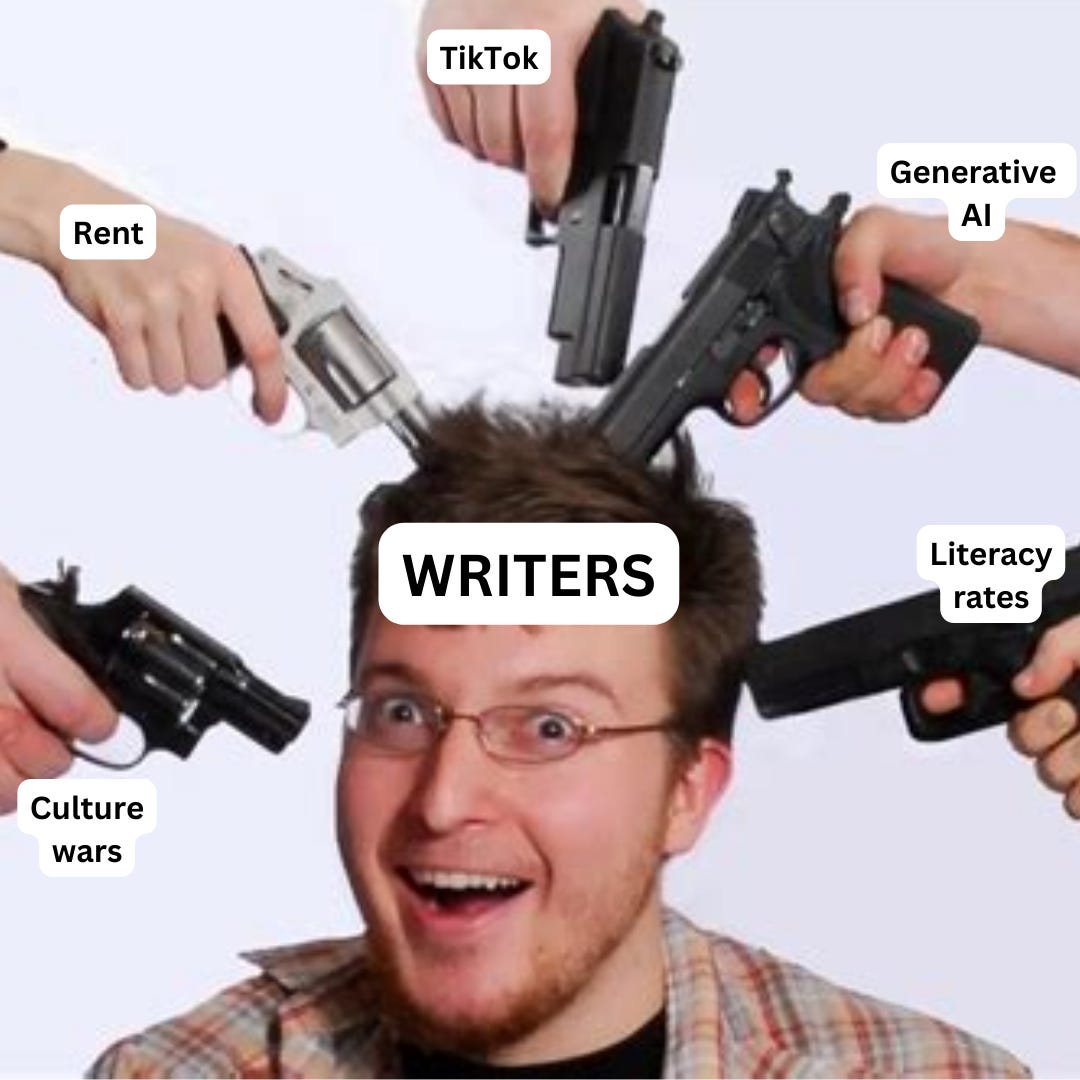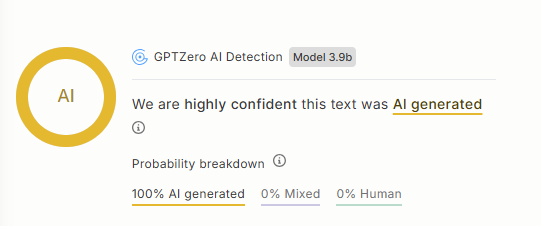We’re being hijacked.
First, it was the Maalvika plagiarism scandal, then some influencer pops up, writing an AI-generated essay, using the fact that yet ANOTHER bogus influencer stole it for LinkedIn clout - for Substack Clout. And it worked; he gained several thousand followers this month. I can’t believe how many people fall for this shit, until I saw it for myself.
You know you really don’t stand a chance out there, but what should you do about it?
Assimilate.
Hijack yourself - at the very least.
The internet is a dangerous intersection
When I volunteered at Hanson Park Elementary in Chicago, I had to drive through what was rumored to be the most carjacked intersection in the city. Every time, I thought about how to avoid it, and what I’d do if I couldn’t.
The first rule: know the risk. I tried a couple different routes, because avoiding the dangerous area is best, but Hanson Park sat right in the middle of it.
Now the whole internet is Hanson Park. We come here to spread the good word, but you need to realize how dangerous it is out here. Someone’s whole business is about stealing your attention, your content, your energy.
One night, I was coming home late. I was tired and my guard was a bit lower than it should have been, and a man threw a bucket of soapy water on my windshield. I floored it through a red light and realized how quickly I could have lost everything.
Now, every time I open my phone, I have to remind myself that the threat is just as real, but slower. Dopamine jackers drain you one click at a time, and the only way to escape is to turn off your devices. There are no safe spaces online anymore. We live in the hood.
Act Like a Human Wrapper
At a dangerous intersection, fear won’t save you, but assimilation might. When I lived in Chicago, several of my friends were attacked, and I saw the pattern - they looked attackable. This isn’t victim-blaming. It’s situational awareness.
The same logic applies here for writers and creatives on the Very Free and Very Open internet. You need to know what you look like and how that sets up in the kind of environment you’re in. The so-called “best-selling newsletters”? Either existing celebrity writers backed by big money or human ChatGPT wrappers. Run a few of their articles through an AI detector and drop the “__% generated by AI” in the comments.
Stealing people’s shit is too good an opportunity for capitalists to pass up on! No such thing as bad press! If you package good ideas poorly, someone is going to jack your shit and sell it under your nose - and blame you! People are building platforms by cranking out AI-generated nonsense or by stealing good human ideas and wrapping them in AI.
I’ve been staunchly against AI because of this and because I think someone must maintain human writing, but my last article taught me something essential: people (even good, cool people) have an appetite for stolen goods, even when they’re pure silicon.
If you didn’t notice, my last essay borrowed its structure from the AI-generated essay I’m talking about. I rewrote it sentence by sentence, and ya’ll ate it up. Most of you didn’t even notice it was his or partially AI-generated, nor did GPTZero:
His essay, on the other hand, came back as a total fraud.
And Part II. And Part III, mostly.
We’re reaching a point where people don’t care if something is AI-generated. In fact, they prefer it. AI-generated writing sells because it feels familiar: it’s prechewed human words spat back in a way statistically designed to please the human mind. Most people want a tiny bit of novelty wrapped in a comfortable package. Polished. Predictable. Addictive.
If you want to survive online, you must write like AI - not because you’re lazy or are giving up, but because attention has a language. Present your ideas in ways people can consume, or risk them being hijacked.
Think of it as online situational awareness. I didn’t drive my husband’s BMW through the carjacking hotspot. You drive something that blends in, or something impossible to touch. I drove something that looked like a clown car, and my writing is much the same. Your writing should be suited to the terrain.
Accepting Reality to Free Yourself
The truth is, it’s a hijack-or-be-hijacked world now. Real writers, those who write to think, need to hear this. I’m pissed, too. But if you want to change the world, you have to first accept it as it is. Write for yourself, but copywrite for the internet.
Jose Ortega y Gasset explains it perfectly:1
“The man with the clear head is the man who frees himself from those fantastic ‘ideas’ and looks life in the face, realises that everything in it is problematic, and feels himself lost…. He who does not really feel himself lost, is lost without remission; that is to say, he never finds himself, never comes up against his own reality.”
The good news is, feeling lost isn’t a weakness - it’s a foundation. If you feel lost, you’re already standing on firmer ground than those who cling to comforting illusions.
Even in this uncertain, messy reality, one thing is clear: no matter how much we writers see ourselves as the intellectual vanguard, you’re reading this on a social media platform. Every major academic journal has a Twitter. On social media, copy is what goes viral. Your feed is optimized for the most popular, mind-burrowing takes. Independent thinkers must accept this and take action.
I didn’t own a gun back when I lived in Chicago. I was young and naive. But today? Statistically speaking, you can’t avoid the violence in certain areas. All you can do is arm yourself. For the modern writer, maybe you don’t need to go to the gun range, but you need to learn how to hold and fire your own attention, even if you never point the weapon at anyone else.
You need to come up against your own reality. Not only is AI being employed to capture attention, but everything is ad copy now. At the very least, you need to know how the gun works:
Appeals to emotion: fear, guilt, pride, FOMO
Call To Action: Implicitly/Explicitly, you’re being asked to like, subscribe, buy.
Repetition: Vague messages get concretized. Repackaged. Retold.
HELPFUL language: “Here’s what you gain by reading”
Social Proof: Appeal to authority/credentials, testimonial, data
Urgency*: You constantly feel compelled to do something after consuming
Simplicity: It goes down like a fuckin’ smoothie
Problem-> Solution: Opens with a problem (I love bad bitches, that’s my fuckin’ problem) and wraps it up with a solution (If finding somebody real is your fuckin’ problem, bring yo girls to the crib, maybe we could solve it)
*Free paid subscription to the first person to name the places where I employed these tactics. Hurry up before someone else gets credit.
Staying human
I know this got real dark real quick, but the trick is staying light and flexible. Situational awareness doesn’t mean hardened paranoia. It means loosening your grip on certainty. For me, that looks like changing my stance on weapons like AI.
Writing itself is still an act of resistance against the absurd, even if you use AI in some capacity. The real writers are happily doomed to clack on a keyboard and scribble into oblivion. Every piece, every draft is another pass through the intersection. And I stay cruisin’ through dangerous intersections, with autopilot or not.
Shit, I didn’t even get paid to risk my life back then. I barely do now, but here we are.
This month, we’re doing 2 events for paid subscribers:
1. Rabbitholes and Reflections Workshop
📅 Sunday, September 28th
⏰ 3:15 PM CST
📍 Discord
2. Book Club Discussion: Ortega y Gasset’s Revolt of the Masses
📅 Sunday, September 28th
⏰ 4:15 PM CST
📍 Discord
Week 32 Experimenting with Absurdism
If you’re following along, here’s your Thought Experiment:
Imagine you’re driving late at night through the most carjacked intersection of your city. You grip the wheel and scan the sidewalks, rehearsing your escape, mind on the glovebox. What’s in it?
You know you’re going to get carjacked. You know you have to go through this intersection. What we doin’ fam?
We’re finishing Revolt of the Masses today on TikTok Live






